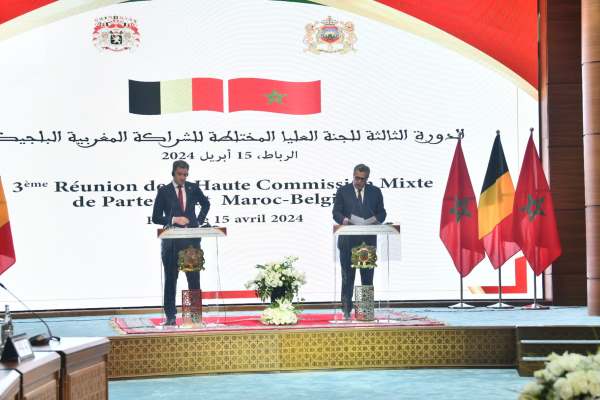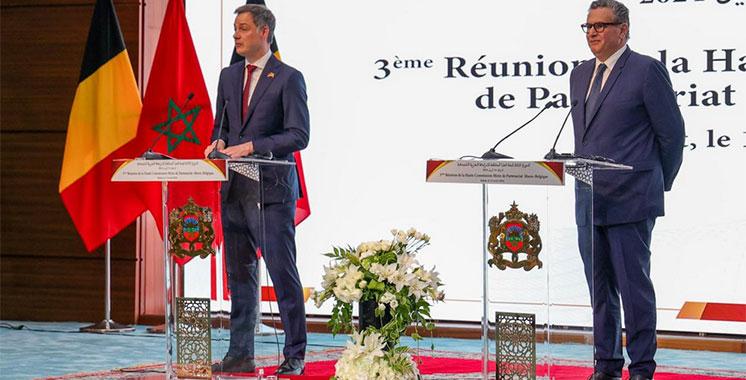Morocco and Belgium welcomed the dynamic nature of their bilateral relations, reaffirming their shared desire to deepen them further with a view to establishing a forward-looking strategic partnership that matches the expectations and potential that exist between the two countries to meet current and future challenges.
In the Joint Declaration adopted on April 15, 2024, at the close of the 3rd Meeting of the Moroccan-Belgian High Joint Partnership Commission, co-chaired by the Head of Government, Aziz Akhannouch, and the Belgian Prime Minister, Alexander De Croo, the two parties also expressed their desire to strengthen cooperation in a number of areas.
Moroccan Sahara:
In the joint declaration, Belgium considers the Moroccan autonomy initiative, presented in 2007, as “a serious and credible effort by Morocco and a good basis for a solution accepted by the parties”.
In this context, De Croo reiterated “Belgium’s long-standing support for the process led by the United Nations for a just, lasting and mutually acceptable political solution for the parties”, read the Declaration.
On this occasion, the two parties agreed on “the exclusivity of the UN in the political process and reaffirmed their support for UN Security Council resolution 2703 (2023), which noted the role and responsibility of the parties in the search for a realistic, pragmatic, lasting political solution based on compromise”, added the same source.
Reforms carried out by Morocco under the leadership of HM King Mohammed VI Belgium welcomes the reforms carried out by Morocco over the past twenty-five years, under the leadership of HM King Mohammed VI, to create a more open and dynamic Moroccan society and economy.
In this joint declaration, Belgium stressed the importance of the New Development Model, advanced regionalization and a number of ambitious reforms, including that currently underway on the Family Code (Moudawana).

As part of its priority commitment to the region, Belgium also welcomes the Atlantic Initiative launched by His Majesty the King as “an innovative contribution to the integration of the African Atlantic and the strengthening of cooperation with the Sahel countries”, the Joint Declaration stated, adding that “the Atlantic is a link between North and South, Africa and Europe, and between the Mediterranean and the Atlantic”.
Security cooperation and migration:
The two Heads of Government emphasized the common interest of both countries in continuing and strengthening bilateral cooperation to combat threats to national and international security.
In terms of security cooperation, they affirmed their willingness to further develop it, notably through the establishment of a regular cooperation structure.
Also, they welcomed the implementation of the Convention on cooperation in combating organized crime and terrorism, which entered into force in 2022, and the 2022-2024 action plan in the field of police cooperation.
The two Heads of Government praised the progress made in the framework of migration cooperation, including the holding of the 1st meeting of the Morocco-Belgium Mixed Migration Group and the joint implementation of effective measures.
On the same topic, the Moroccan Minister of the Interior, Abdelouafi Laftit, received the Belgian Minister of the Interior, Institutional Reform and Democratic Renewal, Annelies Jan Louisa Verlinden, accompanied by the Secretary of State for Asylum and Migration, Nicole De Moor, on the same day.
On this occasion, the two ministers reviewed several issues of common interest and examined ways to further strengthen the dynamic partnership between the two parties, particularly in security and migration, the Interior Ministry said in a press release.
In this regard, the two ministers shared their convergent analysis on multifaceted regional and international issues and agreed to strengthen the exchange of expertise and useful information to better anticipate the multifaceted threats and common challenges induced by the criminal activities of terrorist groups and networks which are active in different forms of cross-border trafficking, the same source added.
In counterterrorism, Laftit reviewed the overall strategy of the Kingdom of Morocco which inseparably reconciles the operational fight and the exchange of information with the preventive approach, particularly against radicalization, as well as reintegration aspects.
In the field of migration, he underlined Morocco’s holistic and humanist approach to migration governance which puts the migrant at the center of public authorities, in accordance with the High Royal Guidelines.
Laftit also recalled Morocco’s active solidarity and its major efforts in terms of border control and the fight against all forms of cross-border crime, which reflects the Kingdom’s major contribution in regional security.
The two ministers emphasized the role of the Permanent Joint Migratory Group set up by the two parties to achieve qualitative and coordinated advances, reconciling all the synergies and sectoral logic around a global and balanced approach to migration management.
Territorial integrity and national unity of Libya:
In the joint declaration issued on Monday in Rabat, Morocco and Belgium reaffirmed their strong commitment to the sovereignty, independence, territorial integrity, and national unity of Libya.
In this Declaration, the two Heads of Government reiterated the central role of the United Nations in facilitating an inclusive political process led by Libyans, resulting in the organization of presidential and legislative elections in Libya.
In this regard, the Belgian party welcomes Morocco’s efforts to resolve the Libyan crisis, notably hosting, from May 22 to June 7, 2023, meetings of the Joint Commission (6+6), tasked with drafting Libyan electoral laws as part of the dialogue process initiated under the auspices of the United Nations.





